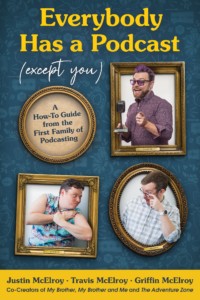
Editor’s note: This story is a collaboration between Timber and the Bello Collective. Timber owes a huge thank you to Bello’s Editor Galen Beebe for writing. If you enjoy this, be sure to read Galen and many other writers’ great podcasting writing over at Bello. You can also sign up for their newsletter and Patreon. I highly recommend the Patreon because it gives special access to a Slack group that includes some of the world’s best audio folk.
One of my favorite Twitter bots is Starting a Podcast. The conceit is simple: It retweets any tweet that includes the phrase “starting a podcast.” I see each tweet as a little burst of possibility—another person picking up a mic—so it won’t surprise you to learn that I firmly believe there are not too many podcasts. It’s always worth it to make something as long as it’s something you love making.

This is the energy of Everybody Has a Podcast (Except You), the new how-to-podcast book from the McElroy brothers, the self-proclaimed “first family of podcasting.”
The McElroy brothers—or McElboys, if you will—began podcasting in 2010 with My Brother My Brother and Me, a comedy advice show in which the three brothers, Justin (the “oldest”), Travis (the “middlest”), and Griffin (the “sweet baby”) advise listeners who write directly to them and strangers who take their questions to Yahoo Answers. The brothers saw early success. They launched MBMBaM (pronounced ma-bim-bam) in April 2010 and, by November of that year, were getting nearly 15,000 listens a week. They operated independently for nine months before joining the podcast network Maximum Fun in January 2011.
In the past decade, the McElroys have created 24 different podcasts. In addition to MBMBaM, the brothers host an actual-play D&D podcast with their dad, Clint McElroy, and have launched other shows with their wives, Rachel McElroy, Teresa McElroy, and Dr. Sydnee McElroy, and a number of friends. The McElroy family of products extends beyond the brothers as well: Sydnee hosts a podcast with her siblings, Teylor and Rileigh Smirl, and Teylor hosts a podcast with a friend. Justin also occasionally hosts an audio-only YouTube series with his 6-year-old daughter.
On the one hand, theirs is the ultimate podcasting rags-to-riches story: three dudes turn on their shitty mics and start riffing. Ten years later, it’s their full-time job. They have toured their shows around the US, created two podcast-related card games, did a six-episode MBMBaM TV show on Seeso in 2017, have an upcoming Adventure Zone animated series on NBC’s Peacock, and are New York Times bestselling authors for The Adventure Zone graphic novels based on their D&D podcast, and The Sawbones Book based on Justin and Sydnee’s medical history podcast.
On the other hand, their success is no surprise at all. The brothers grew up listening to their dad’s show on their local radio station, and Clint himself had followed in his father’s footsteps. When they launched MBMBaM, Griffin and Justin were working at the video game website Joystiq, with Justin co-hosting the site’s podcast. (Travis was working as technical director at the Cincinnati Shakespeare Company.) Griffin and Justin would go on to be founding members of the video game website Polygon, and in 2017, Griffin was named one of Forbes’s 30 under 30 in media. And how could we forget the time in 1995 when Griffin joined Clint in a local education programming segment called Peace on the Playground? Given their backgrounds, it’s no wonder they have done so well in podcasting.
It only makes sense that a how-to-podcast book would come next. Everybody Has a Podcast (Except You) will be released in January 2021. The book is co-written by the McElboys, with guest contributions by Sydnee, Teresa, and Rachel. It’s the second how-to-podcast book published by HarperCollins after Kristin Meinzer’s So You Want to Start a Podcast.

The McElroys are well-poised to advise aspiring podcasters. They have produced fully independent podcasts and produced podcasts within networks. They have worked with many co-hosts, and created many different concepts, and they’ve brought many of their podcasts to a close. Of their 24 shows, only 10 are currently active. (Although, to be fair, one of their podcasts only releases a single episode a year.)
The one thing the McElroy podcasts don’t have is a variety of podcast formats. Everybody Has a Podcast (Except You) is aimed at people who want to make shows like theirs: chat shows, or, as Justin calls them in chapter 4, “boner shows for ding-dongs.” Of the McElroy brothers’ 24 podcasts, 22 are chat shows. Only two are (semi-)scripted: The Adventure Zone and The McElroy Brothers Will Be In Trolls World Tour (a parody of a prestige podcast).
But despite the McElroys’ focused oeuvre, a lot of the advice in their how-to book is widely applicable. They cover the practical aspects of production, including the basics of microphones and audio editing software, paying logo artists, and what to do if you get something wrong in your researched show. They also cover some more philosophical concerns, like how to decide how many “ums” to cut. Their thesis could be summarized in two sentences: make something you care about, and “act like a decent human being” while you do it. The rest is gravy.
The most impactful advice is about how to approach your show. There are sections about minimizing distractions and accepting good enough. Travis advises the reader to think hard about their darlings, evaluate why they hold them so dear, and then, perhaps, kill them. Of course, this advice isn’t new. The phrase “kill your darlings” has been around since 1914. Other lessons remind me of the famous Ira Glass talk about making work, in which he says, in not so many words, you will know your work doesn’t sound great, but you’ll never get to “great” if you don’t start making it. The McElroys aren’t necessarily sharing original pearls of wisdom, but they get at the biggest challenge of being a maker—powering through the hardships of the creative process.
Justin asks, “Do I actually want to put in the time, my most precious resource on this planet, to make this thing exist on Earth?”
The McElboys also get at one of the major contradictions of podcasting: podcasting is easy, but it’s hard, too. At their core, many of the McElroys’ shows are just ”people talking a bunch and then stopping after, like, an hour,” and that’s an easy task for most. But making that hour worth your time and a listener’s—plus doing all the editing, marketing, monetizing, and so on—is not easy at all. It takes a lot of time and effort to make a great podcast, or even a good one, and ultimately, a creator needs to be podcasting for the fun of it. To this end, Justin asks, “Do I actually want to put in the time, my most precious resource on this planet, to make this thing exist on Earth?”
And there’s another person to consider: the listener. “Remember the unspoken contract between podcaster and listener,” Justin writes. “They are giving up their most precious commodity (life minutes) to listen to your show, so the least you can do is make recording your sole focus while you’re in front of the mic.” (In other words, no eating while you record.)
And this brings me to the next most important part of this book: how to be a good person. The brothers explain the fundamentals of human respect, including how to show your audience you love them (and why you should love them in the first place); how to deal when you meet your fans in person; how to get consent to put your arm around someone when you’re taking a picture; and how to respond to trolls with kindness. This section is ostensibly about building your audience, but it’s really about so much more. “One of my biggest frustrations is when I see a creator taking their audience for granted,” Travis tells me in an email. “Sometimes it’s in the way they talk to them. Sometimes it’s not valuing their time. But usually, it’s seeing them as nothing more than potential money to be collected.”
This advice might seem unrelated to their podcasting prowess, but their philosophy is exactly what I like about the McElroys. As they have pointed out many times, the early episodes of MBMBaM have some pretty offensive humor. They were, and I say this lovingly, idiots. But they’ve come a long way in the past decade. They showed as much earlier this month, when John Roderick, who wrote the theme song for MBMBaM, became better known as Bean Dad. The brothers removed Roderick’s song from their show, tweeting, “We appreciate John letting us use one of his songs as the theme for MBMBaM for nearly a decade, but his response to today’s situation is emblematic of a pattern of behavior that is antithetical to the energy we try to bring to the things we do, and so it’s time for us to move on.”
This is the kind of book I would want a beginner podcaster to read—more for the life advice than the technical. You can find a guide to buying a mic online; it’s much harder to find the stamina to keep producing work. Luckily, the book is pretty accessible. It’s written in a casual voice, and it provides simple explanations for potentially complex ideas (like metadata). The writing is better in some parts than others, but if you like the way the brothers talk, you’ll probably like the way they write. The one thing to consider is the language. If this book were a movie, it would get an R rating for language, which might prove problematic for some younger podcasters.
“As far as what is podcast worthy or not, My advice is to ask yourself ‘Will this concept still be fun to do after 100 episodes?’ If you can honestly say yes, it is worth doing!” Travis says.
In both their technical and general advice, the brothers make clear that there’s no one-size-fits-all solution. In the section on digital audio workspaces (DAWs), they have an on-the-page argument about which software is the best. They offer a rule (it’s good to have a consistent structure) and then reveal how one of their own shows breaks that rule (some episodes of The Adventure Zone are 37minutes long while others run close to three hours).
In short, they are saying that if you aim to make the next MBMBaM or The Adventure Zone, you won’t. First off, MBMBaM was created in a different time, as Justin points out. It was 2010 when the brothers launched their first show together; it’s a wonder it even had a concept. But the other reason is that you have to make your show, and they can’t tell you how to make your show—only you can do that. You will learn how to make it in the process of making it, just like the McElroys did. “As far as what is podcast worthy or not, My advice is to ask yourself ‘Will this concept still be fun to do after 100 episodes?’ If you can honestly say yes, it is worth doing!” Travis says.

You won’t close this book with the step-by-step instructions to create a successful podcast. In fact, the McElroys don’t even tell you exactly what “success” means. They podcast full-time, but they don’t promise a reader will be able to do that. They keep the expectations realistically low: podcasting is hard, it generally takes a long time to build a following, and you might never make money from it. But however you monetize or don’t, whatever mic and DAW you end up using—those things don’t really matter. That’s not the essence of the McElroy business. What you can learn from this book is how you should treat your listeners and yourself.




Comments